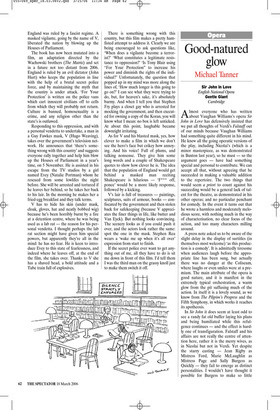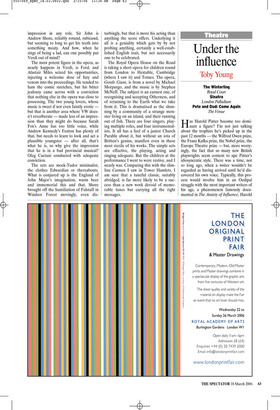Good-natured glow
Michael Tanner
Sir John in Love English National Opera Gentle Giant Cambridge Almost everyone who has written about Vaughan Williams’s opera Sir John in Love has defensively insisted that we put all thoughts of Verdi’s Falstaff out of our minds because Vaughan Williams had something quite different in his mind. He knew all the going operatic versions of the play, including Nicolai’s (which is a minor masterpiece, as was demonstrated in Buxton last year), so he must — so the argument goes — have had something special and personal to contribute. We can accept all that, without agreeing that he succeeded in making a valuable addition to the repertoire. The two things that would seem a priori to count against his succeeding would be a general lack of talent for the theatre, as demonstrated in his other operas; and no particular penchant for comedy. In the event it turns out that he wrote a harmless and moderately melodious score, with nothing much in the way of characterisation, no clear focus of the action, and too many characters milling around.
A press note asked us to be aware of the slight delay in the display of surtitles (in themselves most welcome) ‘as this production is a comedy’. It is admittedly tiresome when audiences laugh before the appropriate line has been sung, but actually there was no danger at the Coliseum, where laughs or even smiles were at a premium. The main attribute of the opera is good nature, and it is manifest in the extremely typical orchestration, a warm glow from the pit suffusing much of the action. In itself it is a lovely sound, as we know from The Pilgrim’s Progress and the Fifth Symphony, in which works it reaches its apotheosis.
In Sir John it does seem at least odd to see a randy fat old buffer laying his plans and being humiliated while this refulgence continues — and the effect is hardly one of transfiguration. Falstaff and his affairs are not really the centre of attention here, rather it is the merry wives, as in Nicolai but not in Verdi. Yet despite the starry casting — Jean Rigby as Mistress Ford, Marie McLaughlin as Mistress Page and Sally Burgess as Quickly — they fail to emerge as distinct personalities. I wouldn’t have thought it possible for Burgess to make so little impression in any role. Sir John is Andrew Shore, reliably rotund, rubicund, but seeming to long to get his teeth into something meaty. And how, when he sings of being a lad, can one possibly put Verdi out of mind?
The most potent figure in the opera, as nearly happens in Verdi, is Ford, and Alastair Miles seized his opportunities, injecting a welcome dose of fury and venom into the proceedings. He tended to ham the comic stretches, but his bitter jealousy came across with a conviction that nothing else in the opera was close to possessing. The two young lovers, whose music is sweet if not even faintly erotic but that is another area where VW doesn’t reverberate — made less of an impression than they might do because Sarah Fox’s Anne has too little voice, while Andrew Kennedy’s Fenton has plenty of that, but needs to learn to look and act a plausible youngster — after all, that’s what he is, so why give the impression that he is in a bad provincial musical? Oleg Caetani conducted with adequate conviction.
The sets are mock-Tudor minimalist, the clothes Edwardian or thereabouts. What is conjured up is the England of John Major’s imagination, warm beer and immemorial this and that. Shore brought off the humiliation of Falstaff in Windsor Forest movingly, even dis turbingly, but that is more his acting than anything the score offers. Underlying it all is a geniality which gets by by not probing anything, certainly a well-established English trait, but not necessarily one to be celebrated.
The Royal Opera House on the Road is taking a short opera for children round from London to Hextable, Cambridge (where I saw it) and Totnes. The opera, Gentle Giant, is from a novel by Michael Morpurgo, and the music is by Stephen McNeff. The subject is an earnest one, of recognising and accepting Otherness, and of returning to the Earth what we take from it. This is dramatised as the shunning by a community of a strange monster living on an island, and their running out of fish. There are four singers, playing multiple roles, and four instrumentalists. It all has a feel of a junior Church Parable about it, but without an iota of Britten’s genius, manifest even in these most sterile of his works. The simple sets are effective, the playing, acting and singing adequate. But the children at the performance I went to were restive, and I nearly was. Comparing this with the slimline Carmen I saw in Tower Hamlets, I am sure that a tuneful classic, suitably abridged, is far more likely to be a success than a new work devoid of memorable tunes but carrying all the right messages.



















































































 Previous page
Previous page